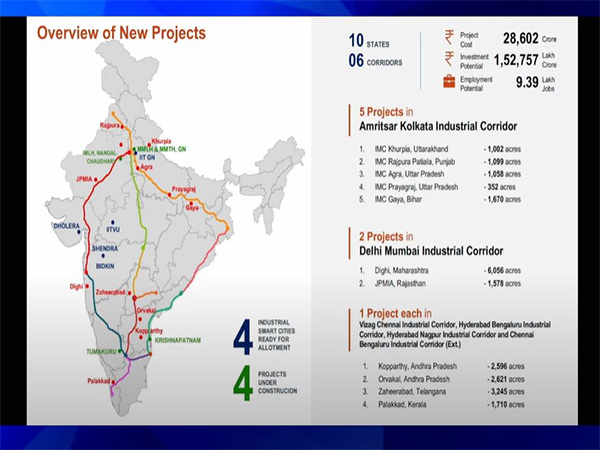India Fast-Tracks Industrial Growth with 12 New Smart Cities
The Indian government has approved 12 new industrial smart city projects, investing Rs 28,602 crore. Spread across 10 states, they are set to transform the industrial landscape, boosting economic growth and global competitiveness. These cities will create significant employment opportunities and align with PM GatiShakti National Master Plan.

- Country:
- India
India will soon adorn a network of industrial smart cities. On Wednesday, the Cabinet Committee on Economic Affairs, chaired by Prime Minister Narendra Modi, greenlit 12 new project proposals under the National Industrial Corridor Development Programme. The initiative, with an estimated investment of Rs 28,602 crore, is expected to reshape the nation's industrial landscape.
This decision aims to establish a robust network of industrial nodes and cities, significantly enhancing economic growth and global competitiveness. Spanning across 10 states and strategically aligned along six major corridors, these projects mark a substantial step forward in bolstering India's manufacturing capabilities.
The new industrial areas will be set up in Khurpia in Uttarakhand, Rajpura-Patiala in Punjab, Dighi in Maharashtra, Palakkad in Kerala, Agra and Prayagraj in Uttar Pradesh, Gaya in Bihar, Zaheerabad in Telangana, and Orvakal and Kopparthy in Andhra Pradesh, as well as Jodhpur-Pali in Rajasthan. They are designed to foster a vibrant industrial ecosystem, encouraging investments from large anchor industries and Micro, Small, and Medium Enterprises (MSMEs).
The industrial nodes are projected to propel India toward achieving USD 2 trillion in exports by 2030, reflecting the government's vision of a self-reliant and globally competitive economy. Developed as greenfield smart cities of global standards, they will embrace the 'plug-n-play' and 'walk-to-work' concepts and be built 'ahead of demand'.
Aligned with the PM GatiShakti National Master Plan, these projects will include multi-modal connectivity infrastructure, ensuring the seamless movement of people, goods, and services. The smart cities are envisioned as growth centers, potentially generating significant employment opportunities, with an estimated one million direct and three million indirect jobs through planned industrialization.
The government remarked, "This will not only provide livelihood opportunities but also contribute to the socio-economic upliftment of the regions where these projects are being implemented." (ANI)
(With inputs from agencies.)
ALSO READ
Tripura Government Creates 255 New Jobs to Boost Employment
Job Growth Surge: India's Employment Transformation under Modi
India's Employment Boom: 17.6 Crore Jobs Created in a Decade
I do not engage myself in personal attacks: AAP supremo Arvind Kejriwal on PM Narendra Modi's ''Sheeshmahal'' jibe at him.
German Unemployment Rises Below Expectations in December










